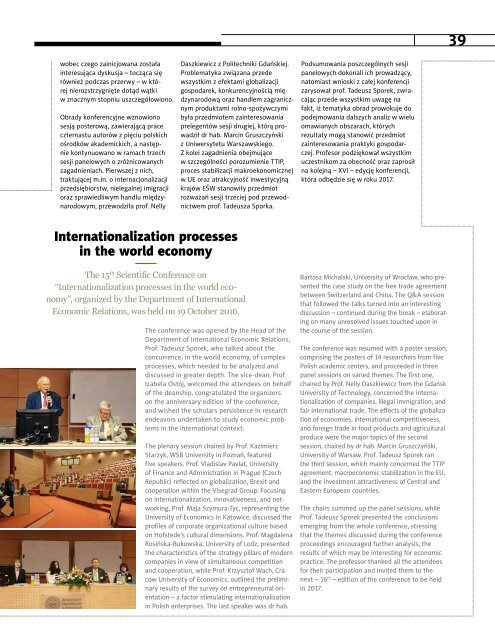Wisniewski
FORUM_nr_44_2017-01-02
FORUM_nr_44_2017-01-02
Create successful ePaper yourself
Turn your PDF publications into a flip-book with our unique Google optimized e-Paper software.
39<br />
wobec czego zainicjowana została<br />
interesująca dyskusja – tocząca się<br />
również podczas przerwy – w której<br />
nierozstrzygnięte dotąd wątki<br />
w znacznym stopniu uszczegółowiono.<br />
Obrady konferencyjne wznowiono<br />
sesją posterową, zawierającą prace<br />
czternastu autorów z pięciu polskich<br />
ośrodków akademickich, a następnie<br />
kontynuowano w ramach trzech<br />
sesji panelowych o zróżnicowanych<br />
zagadnieniach. Pierwszej z nich,<br />
traktującej m.in. o internacjonalizacji<br />
przedsiębiorstw, nielegalnej imigracji<br />
oraz sprawiedliwym handlu międzynarodowym,<br />
przewodziła prof. Nelly<br />
Daszkiewicz z Politechniki Gdańskiej.<br />
Problematyka związana przede<br />
wszystkim z efektami globalizacji<br />
gospodarek, konkurencyjnością międzynarodową<br />
oraz handlem zagranicznym<br />
produktami rolno-spożywczymi<br />
była przedmiotem zainteresowania<br />
prelegentów sesji drugiej, którą prowadził<br />
dr hab. Marcin Gruszczyński<br />
z Uniwersytetu Warszawskiego.<br />
Z kolei zagadnienia obejmujące<br />
w szczególności porozumienie TTIP,<br />
proces stabilizacji makroekonomicznej<br />
w UE oraz atrakcyjność inwestycyjną<br />
krajów EŚW stanowiły przedmiot<br />
rozważań sesji trzeciej pod przewodnictwem<br />
prof. Tadeusza Sporka.<br />
Podsumowania poszczególnych sesji<br />
panelowych dokonali ich prowadzący,<br />
natomiast wnioski z całej konferencji<br />
zarysował prof. Tadeusz Sporek, zwracając<br />
przede wszystkim uwagę na<br />
fakt, iż tematyka obrad prowokuje do<br />
podejmowania dalszych analiz w wielu<br />
omawianych obszarach, których<br />
rezultaty mogą stanowić przedmiot<br />
zainteresowania praktyki gospodarczej.<br />
Profesor podziękował wszystkim<br />
uczestnikom za obecność oraz zaprosił<br />
na kolejną – XVI – edycję konferencji,<br />
która odbędzie się w roku 2017.<br />
Internationalization processes<br />
in the world economy<br />
The 15 th Scientific Conference on<br />
“Internationalization processes in the world economy”,<br />
organized by the Department of International<br />
Economic Relations, was held on 19 October 2016.<br />
The conference was opened by the Head of the<br />
Department of International Economic Relations,<br />
Prof. Tadeusz Sporek, who talked about the<br />
concurrence, in the world economy, of complex<br />
processes, which needed to be analyzed and<br />
discussed in greater depth. The vice-dean, Prof.<br />
Izabela Ostój, welcomed the attendees on behalf<br />
of the deanship, congratulated the organizers<br />
on the anniversary edition of the conference,<br />
and wished the scholars persistence in research<br />
endeavors undertaken to study economic problems<br />
in the international context.<br />
The plenary session chaired by Prof. Kazimierz<br />
Starzyk, WSB University in Poznań, featured<br />
five speakers. Prof. Vladislav Pavlat, University<br />
of Finance and Administration in Prague (Czech<br />
Republic) reflected on globalization, Brexit and<br />
cooperation within the Visegrad Group. Focusing<br />
on internationalization, innovativeness, and networking,<br />
Prof. Maja Szymura-Tyc, representing the<br />
University of Economics in Katowice, discussed the<br />
profiles of corporate organizational culture based<br />
on Hofstede’s cultural dimensions. Prof. Magdalena<br />
Rosińska-Bukowska, University of Lodz, presented<br />
the characteristics of the strategy pillars of modern<br />
companies in view of simultaneous competition<br />
and cooperation, while Prof. Krzysztof Wach, Cracow<br />
University of Economics, outlined the preliminary<br />
results of the survey on entrepreneurial orientation<br />
– a factor stimulating internationalization<br />
in Polish enterprises. The last speaker was dr hab.<br />
Bartosz Michalski, University of Wrocław, who presented<br />
the case study on the free trade agreement<br />
between Switzerland and China. The Q&A session<br />
that followed the talks turned into an interesting<br />
discussion – continued during the break – elaborating<br />
on many unresolved issues touched upon in<br />
the course of the session.<br />
The conference was resumed with a poster session,<br />
comprising the posters of 14 researchers from five<br />
Polish academic centers, and proceeded in three<br />
panel sessions on varied themes. The first one,<br />
chaired by Prof. Nelly Daszkiewicz from the Gdańsk<br />
University of Technology, concerned the internationalization<br />
of companies, illegal immigration, and<br />
fair international trade. The effects of the globalization<br />
of economies, international competitiveness,<br />
and foreign trade in food products and agricultural<br />
produce were the major topics of the second<br />
session, chaired by dr hab. Marcin Gruszczyński,<br />
University of Warsaw. Prof. Tadeusz Sporek ran<br />
the third session, which mainly concerned the TTIP<br />
agreement, macroeconomic stabilization in the EU,<br />
and the investment attractiveness of Central and<br />
Eastern European countries.<br />
The chairs summed up the panel sessions, while<br />
Prof. Tadeusz Sporek presented the conclusions<br />
emerging from the whole conference, stressing<br />
that the themes discussed during the conference<br />
proceedings encouraged further analysis, the<br />
results of which may be interesting for economic<br />
practice. The professor thanked all the attendees<br />
for their participation and invited them to the<br />
next – 16 th – edition of the conference to be held<br />
in 2017.


